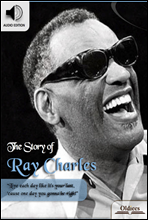
- Le notaire de Chantilly
Рњ | Project Gutenberg

- ГЛ РхЗЪНФПЁДТ ОюЖВ РНОЧРЛ ЦВБю?
<ПЉЧрРкИоРЬ> Рњ | ОѓЗаКЯ

- La famiglia Bonifazio; raccont...
... | Project Gutenberg


РќРкУЅРИЗЮ ИИГЊДТ РЇРЮ БзИЎАэ ПЕОюЧаНР!
ММАшИІ КћГН <ЗЙРЬ ТћНК>РЧ АЈЕПРћРЮ Л§ОжПЭ МћАмСј ЕоОъБтИІ ИИГЊКИММПф.
РЬ УЅРК ММЗУЕШ ПЕОю ЧЅЧіЕщАњ Л§Л§Чб ПРЕ№ПРИІ ЦїЧдЧЯПЉ ПЕОюИІ ЙшПьАэРк ЧЯДТ РЬПЁАд ОјРЬ ССРК ЧаНР РкЗсРдДЯДй. ЕЖРкРЧ ПЕОюМіСиПЁ ХЉАд БИОжЙоСі ОЪЕЕЗЯ НБСіЕЕ ОюЗЦСіЕЕ ОЪРК СпБоРЧ ПЕОю ДмОюЕщЗЮ БИМКЕЧОњРИИч ПРЕ№ПРДТ РЯЙнРћРЮ ИЛЧЯБт МгЕЕРЧ 2/3 МіСиРИЗЮ СІРлЕЧОњНРДЯДй.
Ray Charles Robinson (September 23, 1930 June 10, 2004), professionally known as Ray Charles, was an American singer, songwriter, musician and composer, who is sometimes referred to as "The Genius". He pioneered the genre of soul music during the 1950s by combining rhythm and blues, gospel, and blues styles into the music he recorded for Atlantic Records. He also contributed to the racial integration of country and pop music during the 1960s with his crossover success on ABC Records, most notably with his two Modern Sounds albums. While he was with ABC, Charles became one of the first African-American musicians to be granted artistic control by mainstream record company. Charles was blind from the age of seven. Charles cited Nat King Cole as primary influence, but his music was also influenced by jazz, blues, rhythm and blues, and country artists of the day, including Art Tatum, Louis Jordan, Charles Brown and Louis Armstrong. Charles' playing reflected influences from country blues, barrelhouse and stride piano styles. He had strong ties to Quincy Jones, who often cared for him and showed him the ropes of the "music club industry." Frank Sinatra called him "the only true genius in show business", although Charles downplayed this notion. In 2004, Rolling Stone ranked Charles at number ten on their list of the "100 Greatest Artists of All Time", and number two on their November 2008 list of the "100 Greatest Singers of All Time". Billy Joel observed: "This may sound like sacrilege, but think Ray Charles was more important than Elvis Presley".































